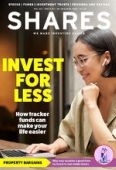Archived article
Please note that tax, investment, pension and ISA rules can change and the information and any views contained in this article may now be inaccurate.
Foreign currency ETFs explained and how exchange rates affect performance

Holidaymakers will be familiar with exchanging pounds for euros and dollars when making trips abroad. A weak pound can make that trip more expensive, or a strong pound can result in extra cash to spend.
Exchange rates also impact investing in overseas markets, but unlike the holidays example a weak pound has a positive benefit for investors as we explain in this article.
Exchange-traded funds or ETFs often have different currency classes available which gives investors greater choice but deciding which one is best can seem daunting.
Don’t be put off, because the listing currency doesn’t make much difference to the return investors receive. It’s the currency of the underlying investments in the ETF that matters.
Before getting into the details, it is worth emphasising currencies are notoriously difficult to predict. So much so that analysts don’t bother trying to forecast future exchange rates when drawing up their company earnings estimates.
Historically currencies have been more volatile (annual price variability or fluctuation) than bonds or fixed interest securities and less volatile than shares.
HOW DOES IT WORK?
Currencies can help performance and be a source of return as well as a risk. Let’s start with a single company example.
If Jim purchased 100 shares of Tesla (TSLA:NASDAQ) at $130 for $13,000 his investment platform provider should convert the US price into pounds and deduct exchange rate fees and commissions.
Let’s say Jim received an exchange rate of $1.23 dollars to the pound. The cost before charges is £10,569.
If the pound weakens (buys fewer dollars) from $1.23 to say $1.05 in a year’s time Jim will earn a bigger return due to the increased value of the dollar. Let’s say Tesla shares rise 20%.
The sale price of Tesla would be $156 a share giving US proceeds of $15,600 and a dollar profit of $2,600 (20%). But when converted back into sterling Jim would receive $15,600/$1.05 which is £14,857.
So, in pounds Jim’s profit would be £14,857 minus £10,569 which is £4,287, or 40%, doubling his dollar return.
These dynamics apply to all overseas investments which need to be converted back into pounds including ETFs that hold foreign stocks.
But ETFs offer investors the choice of buying foreign currency classes such as a US dollar class or sterling class.
In the former, investors incur exchange rate costs to convert pounds into dollars. In the latter, they don’t. But ultimately the pounds need to be converted by the fund to be invested into US shares.
Buying the GBP class saves exchange rate fees when converting the purchase and sales from dollars back into sterling.
For example, the Vanguard S&P 500 ETF (VUSA) priced in pounds has returned 51.2% over the last five years. The same ETF priced in US dollars (VUAA) has returned 48.9%.
When considering global funds there are more currencies impacting performance, but the principles are the same. A weak pound will enhance returns and a strong one will detract.
Another thing to consider is that because global funds are exposed to several currencies, they tend to naturally hedge each other as rising currencies are offset by falling ones.
It is possible to buy GBP hedged ETFs which aim to remove underlying currency effects. But they do not eliminate all the risk and they can cost more because hedging can be expensive. ETFs which are hedged will have ‘GBP Hedged’ in the description.
BONDS ARE DIFFERENT
Investors do not buy bonds for capital growth but rather for their stable income and portfolio stabilisation qualities. Bond prices tend to move up when equities move down, but this isn’t always the case as 2022 showed.
Global bond ETF providers usually hedge foreign currency exposure to minimise the risk of wiping out the relatively low fixed return and reduce volatility.
Important information:
These articles are provided by Shares magazine which is published by AJ Bell Media, a part of AJ Bell. Shares is not written by AJ Bell.
Shares is provided for your general information and use and is not a personal recommendation to invest. It is not intended to be relied upon by you in making or not making any investment decisions. The investments referred to in these articles will not be suitable for all investors. If in doubt please seek appropriate independent financial advice.
Investors acting on the information in these articles do so at their own risk and AJ Bell Media and its staff do not accept liability for losses suffered by investors as a result of their investment decisions.
Issue contents
Exchange-Traded Funds
Feature
- Why a £100,000 limit on ISAs is a bad idea
- Why InterContinental Hotels is turning investor heads
- Why real estate stocks could be a good bet for the medium term
- Emerging markets: Chinese reopening, a big renewables push and an earnings recovery
- Why emerging markets could be on the cusp of a green revolution
Great Ideas
News
- Thungela loses its crown as coal prices fall back
- Could Procter & Gamble’s latest update spell trouble for its UK rivals?
- Expert predicts further bad news for popular investment trust Scottish Mortgage
- Activist investors give big boost to Salesforce and Restaurant Group
- How Saga shares have more than doubled in three months

 magazine
magazine








